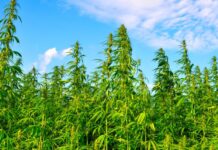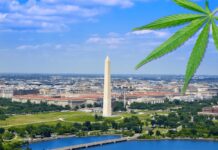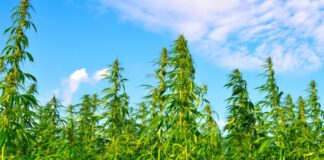What sort of footprint does cannabis cultivation leave on water use? How does cannabis cultivation affect wildlife? How have cultivation practices changed following broad legalization?
There is no shortage of academic research on the subject of cannabis, yet plenty of questions remain to better understand the impacts of cannabis cultivation. That’s the thinking behind an academic research center launched in January 2019 to look at how cannabis production affects the environment and society, and how these effects will evolve under new regulations following the spread of legalization.
The Berkeley Cannabis Research Center, hosted by the University of California, Berkeley, is believed by its founders to be the first in the 10-campus University of California system to explore “oft-overlooked dimensions of cannabis growth.”
Overview of the University of California, Berkeley campus from the Berkeley Lab, from up the hills and south-westward.
Photo by user “Introvert” via Wikimedia Commons.
“We’d like to provide some basic science about cannabis and cannabis policy,” said Van Butsic, the center’s co-director.
Butsic studies the geographic spread of cannabis agriculture using remote sensing techniques and econometric modeling. He was among a group of academics who began collaborating on the center around 2017, after concluding that there would be benefits to pooling their efforts since they were already all working on issues related to cannabis, the environment and cannabis policy.
“We just realized that a lot of the problems and solutions associated with cannabis production can best be solved by taking an interdisciplinary approach,” Butsic said.
Even in a state such as California, where recreational cannabis use is legal and medical use has been legal for more than 20 years, basic questions beg scientific study, Bustic said, such as how cannabis growing affects hydrological cycles and the freshwater environment, and how farmers are changing practices to be compliant with regulations.
The goal of the center is to try to answer such questions and engage with the community, he said. The center was funded with seed money from the university, and the academics write grants and appeal to foundations to fund their efforts. Butsic declined to disclose the dollar amount of funding the center has.
The center is affiliated with the UC Berkeley Social Science Matrix, a flagship institute for social science research that supports cross-disciplinary projects being pursued by more than 500 social scientists across the Berkeley campus and beyond.
The research and outreach of the center will focus on the relations between three core areas: policy and regulation, environmental impacts, and cannabis producing communities.
University of California Berkeley campus. Photo by Charlie Nguyen via Flickr
In terms of policy and regulation, the center team seeks to answer such questions as:
- What formal and informal systems are developing to manage the environmental impacts of cannabis production?
- How do regulations affect various scales of farming?
- What factors determine whether growers comply with regulations?
- How has cannabis cultivation changed over the past 40 years, and how will it change following increased supply and demand?
- How has commercial legislation affected the agricultural, social, and environmental practices of black-market producers?
- What effect do policy and industrial changes have within cannabis-producing communities and in the industry?
Researchers would also like to explore environmental impacts, including questions such as:
- The water footprint of cannabis cultivation — what are the primary sources of water used for irrigation, when is water diverted, and how much water is stored and applied for irrigation?
- How does cannabis water use affect stream flows needed for the health and survival of endangered species, such as salmon and other aquatic organisms?
- What is the impact of cannabis cultivation on wildlife?
- What mitigation strategies might be effective for reducing impacts?
- Cannabis producing communities:
A dozen academics staff the center with a variety of focuses of study, including center co-director Ted Grantham, who studies the hydrology of rivers; center co-director Eric Biber, who researches environmental and land use law; Mary Power, who studies food webs in rivers and watersheds; Nathan Sayre, who studies the political ecology of the western U.S.; and Phoebe Parker-Shames, who studies how land use change shapes wildlife communities.
“We understand that regulation affects farmers’ decisions and ultimately the environment,” the team stated on its website. “We also believe that scientific information on the ecological impacts of cannabis, in turn, influences farmer practices and regulation. By researching the system as a whole we aim to understand the ecosystem of cannabis agriculture in all its complexities.”
Don Jergler
Don Jergler is the Regional West Editor for Insurance Journal and a veteran business and real estate reporter. He has contributed coverage for the Long Beach Press Telegram, Long Beach Register, Los Angeles Times Custom Publishing and a variety of trade publications.











